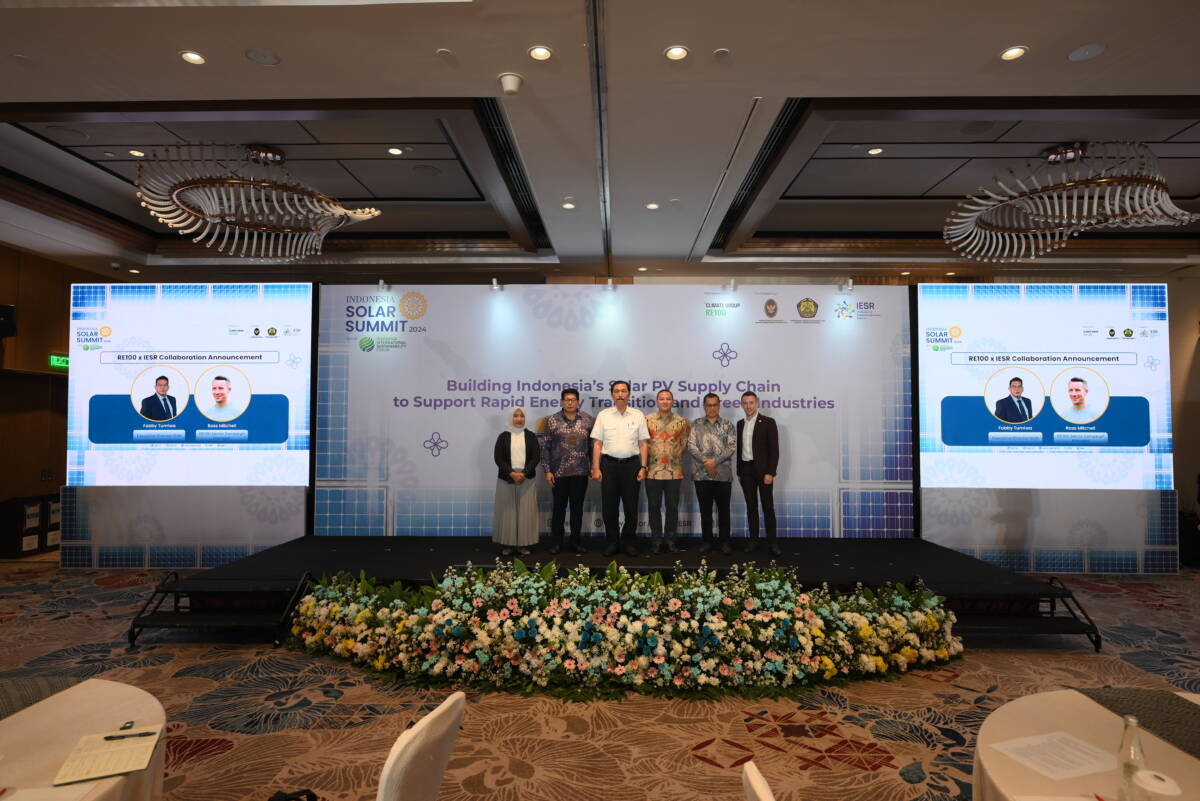Jakarta, August 21, 2024 – Coordinating Minister for Maritime Affairs and Investment, Luhut Binsar Pandjaitan, today highlighted the importance of enhancing Indonesia’s domestic solar energy supply chain and the country’s human capital in its clean energy pathway to address the global climate crisis. He made the statement at the Indonesia Solar Summit (ISS) 2024).
“The Indonesian government, through PLN, will soon launch a 60 GW renewable energy development program. Indonesia has also signed a renewable energy development cooperation agreement with Singapore and attracted investment in green energy exports, solar farms, and battery energy storage systems (BESS),” Luhut said. As a result of this cooperation with Singapore, investments from energy developers are expected to reach USD 30-50 billion, with an additional USD 1.7 billion in solar panel manufacturing and USD 1 billion from battery and inverter manufacturers.
Solar power plants are expected to become one of Indonesia’s primary energy sources for decarbonizing the energy sector and achieving net-zero emissions (NZE) by 2060 or earlier. According to the draft National Electricity Master Plan prepared by the Ministry of Energy and Mineral Resources in 2023, the installed capacity of solar power plants is projected to reach between 410 GW and 460 GW by 2060 to meet the NZE target. This indicates that the demand for solar modules will continue to grow each year.
To meet the demand for solar modules needed for domestic electricity infrastructure development, which could reach tens of gigawatts annually, Indonesia must be capable of producing at least solar cells and modules. This industry must be supported by strengthening the solar cell technology supply chain, moving further upstream to include polysilicon, ingots, wafers, and other components, particularly low-iron tempered glass.
Sahid Junaedi, Secretary of the Directorate General of Various Renewable Energy and Energy Conservation at the Ministry of Energy and Mineral Resources (MEMR), stated that some of the strategies to achieve NZE include utilizing new renewable energy, gradually phasing down coal-fired power plants (PLTU), electrifying various sectors, employing advanced technologies such as CCS/CCUS, and enhancing energy efficiency. Additionally, after 2030, all new power generation will come solely from renewable energy sources. By 2035, this will predominantly be variable renewable energy (VRE), with solar power plants being a key component.
Executive Director of the Institute for Essential Services Reform (IESR), Fabby Tumiwa, stated that the Indonesian government recently issued a regulation regarding Local Content Requirement relaxation. This move could create an opportunity to boost demand for solar modules in electricity projects. However, if not managed well, this regulation could potentially undermine the competitiveness of local solar modules, which must compete with cheaper and higher-quality imported modules.
“For this reason, the government needs to support local solar module producers by providing capital assistance and offering fiscal and non-fiscal incentives to reduce production costs, enabling them to compete with imported modules. Additionally, regulations are needed to create a dedicated domestic market to absorb local production while collaborating with global producers for technology transfer,” Fabby said.
According to Fabby, the government needs to intervene to address the challenges in developing the PLTS industry supply chain. He explained that the capital expenditure required to build a supply chain for polysilicon, wafers, cells, and solar modules is approximately USD 170 to 190 million per gigawatt (GW) of capacity. To attract investors, given the investment value and associated risks, the government must formulate a comprehensive package of policies and incentives, both to support the industry and to create domestic demand.
Strategically, IESR encourages that Indonesia should aim to achieve several key objectives between 2024 and 2029. Firstly, domestic solar PV module manufacturers should utilize solar cells produced locally. Secondly, supporting components for solar PV systems should be sourced from the domestic industry. Thirdly, domestic solar PV modules need to be competitive in terms of price, quality, and bankability. Additionally, there should be progress toward achieving independence in the solar PV component supply chain to meet the Net Zero Emissions (NZE) target. Finally, Indonesia should strive to become a component manufacturer with a notable global market share.
Ollie Wilson, Head of RE100, stated that as an organization overseeing industries committed to using 100 percent renewable energy in their production processes, a strong and integrated solar PV component supply chain will enable industries to access renewable energy at more affordable costs.
“We know that businesses operating in Indonesia are calling out for more access to renewable electricity. By having a domestic solar PV industry these businesses and hundreds more throughout Indonesia can access cheaper, cleaner electricity to help them meet their international commitments and ensure Indonesia can deliver on its net zero targets,” Ollie Wilson said.
The Indonesia Solar Summit 2024 is organized by the Institute for Essential Services Reform (IESR) in collaboration with the Coordinating Ministry for Maritime Affairs and Investment, the Ministry of Energy and Mineral Resources (MEMR), and in partnership with the RE100. The theme for the 2024 Indonesia Solar Summit (ISS) is “Building the Indonesian Solar PV Supply Chain to Accelerate the Energy Transition and Support the Green Industry. ISS 2024 is a pre-event of the Indonesia Sustainability Forum 2024.

